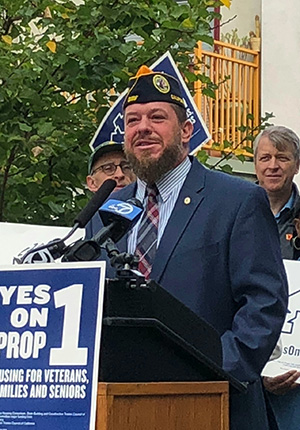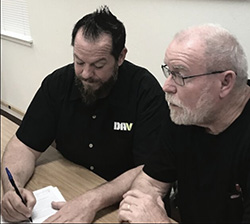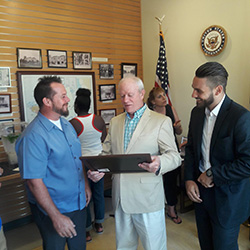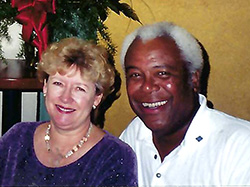
Army veteran J.R. Wilson compared the feeling of speaking to a member of Congress for the first time to being a junior enlisted soldier having to talk to a general. He was nervous, but that quickly faded.
“What really surprised me was how down to earth they are,” he said. “It was a lot easier to talk to them than I anticipated, because they want to serve veterans, too.”
Now Wilson, who is the legislative director for the DAV Department of California, regularly talks to lawmakers at all levels of government to push for legislation that benefits ill and injured veterans and their families. He sees civic engagement as a duty that all veterans should be engaged in.
“Veterans serve their country. Veterans serve their community,” he said. “It’s not about a pat on the back. It’s about serving that veteran and their family and helping them get the benefits that they earned.”
The conversations he and other DAV members have had make a difference. In 2022, Wilson and other members of a small California delegation traveled around the state to encourage members of Congress to pass the Honoring our PACT Act, the most comprehensive toxic exposure legislation affecting veterans ever.
Rep. Doug LaMalfa was one legislator they met with who was on the fence about the bill.

During that meeting, Wilson and his team shared the story of Bob Brooks, an Air Force veteran who had been stationed at Ubon Royal Thai Air Force Base in Thailand during the Vietnam War and who later had several cancers linked to Agent Orange exposure. DAV had been helping him since 2013 but was unable to get a favorable ruling from the Department of Veterans Affairs because the law didn’t recognize the base as being exposed to the herbicide. Brooks died in 2017.
Wilson said Brooks’ story effectively illustrated how the PACT Act would affect family members and survivors—not just veterans. Language in the bill would add Thailand to the list of VA-recognized areas for presumptive Agent Orange exposure.
“Later on that day, we got a call saying that [Congressman LaMalfa] was going to support the bill,” he said. “And then when the vote came down, we saw that he voted yes.”
DAV National Legislative Director Joy Ilem said conversations like that illustrate how crucial it is for DAV members to talk with elected officials and advocate for DAV’s critical policy goals.
“Congress controls the money, but we remind them of their obligation to those who’ve served,” she said.

Wilson said advocacy starts well before those conversations happen, with members participating in DAV’s annual resolution process; DAV’s critical policy goals are borne from issues raised at department and chapter meetings.
“That’s where the engagement really begins, is at that local level,” said Wilson. “Your vote matters. Your input matters.”
Ilem said chapter-approved resolutions move on to the department level and then the national level, where they’re voted on during the DAV and Auxiliary national convention each year. Adopted resolutions make up DAV’s legislative program for the year and allow the organization to endorse critical veteran-related federal legislation.
However, this process is strictly nonpartisan. DAV does not endorse political parties or candidates.
“As the DAV Bylaws and Constitution point out, our purpose is ‘to advance the interests and work for the betterment of all wounded, gassed, injured and disabled veterans,’” Ilem said.

To be that support to fellow veterans, Wilson said it’s important for DAV members to vote in all government elections, educate themselves about issues affecting veterans, know DAV’s critical policy goals and use resources like DAV’s national legislative team when they have questions.
After the president signed the PACT Act into law in August 2022, Wilson said DAV filed an appeal on behalf of Brooks and his widow, Barbara, keeping a promise made to the family.
“We told him and his wife before he passed that we’re never going to give up on the claim,” said Wilson.
This time, the VA approved Brooks’ appeal.
“It was the way Bob was able to help her,” said Wilson.






